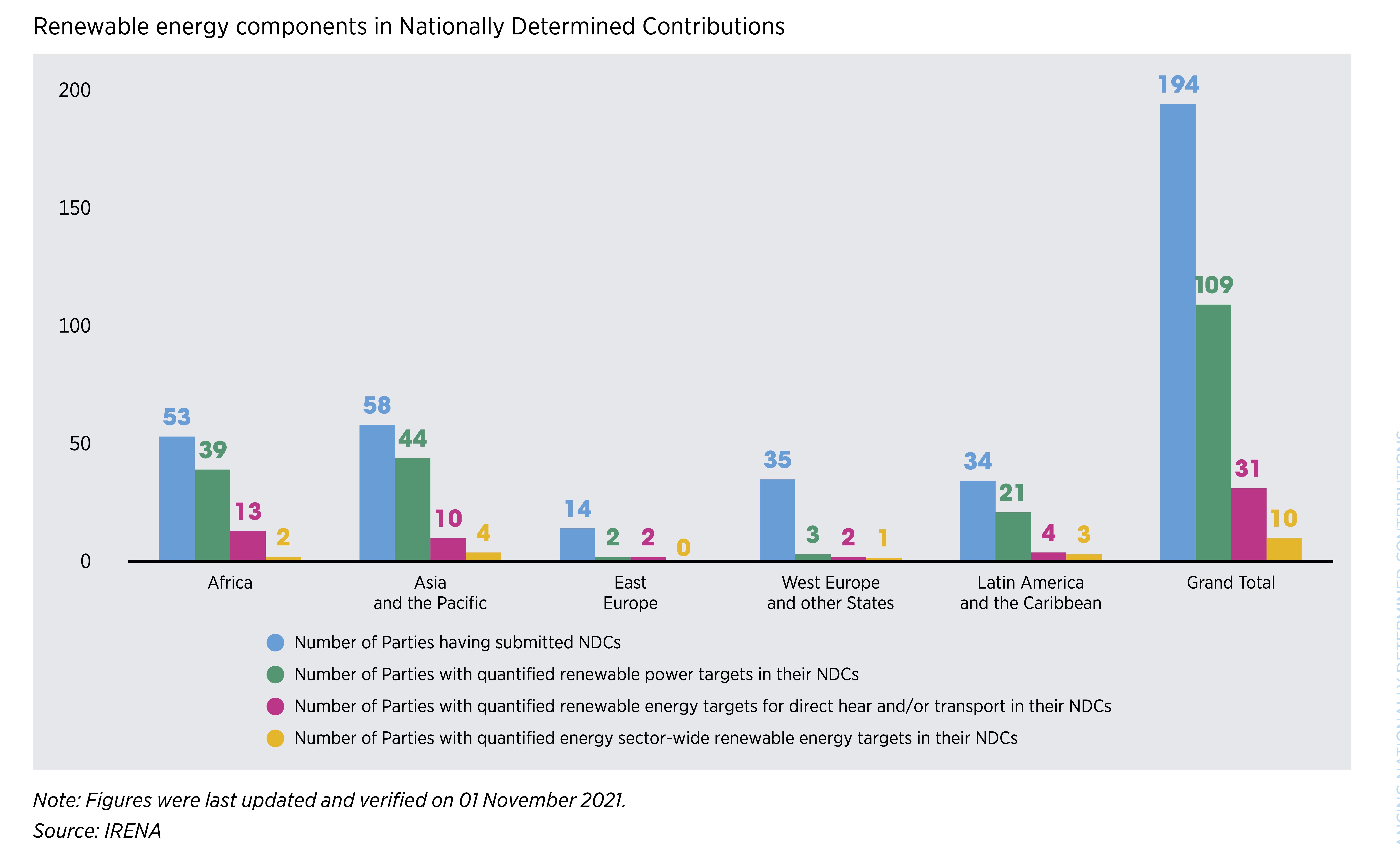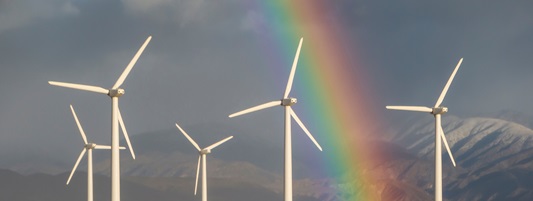Climate Action
Overview
As we experience more instances of extreme weather events, there is a need for concerted global climate action to avoid dangerous and irreversible levels of climate change. The Paris Agreement sets a goal to limit the increase in global average temperature to well below 2°C above pre-industrial levels and to attempt to limit the increase to 1.5°C. Implicit in these goals is the need for a transition to a net-zero energy sector, which accounts for two-thirds of global emissions. Renewable energy, coupled with energy efficiency and end-use electrification, can provide 90% of the CO2 emissions reductions needed by 2050.
Renewable energy is, therefore, a key component of Nationally Determined Contributions (NDCs) – the central climate action plan for countries under the Paris Agreement. At present, the level of detail contained in NDCs differs from country to country, with respect to national circumstances and quantitative information about the role of renewable energy and electrification in meeting greenhouse gas (GHG) emission reduction targets. In this regard, IRENA, as the lead intergovernmental agency, is working on energy transition intends to leverage its existing work on energy transition technologies, policies, financing and project facilitation working with its member states and Parties to the Paris Agreement to increase the energy transition ambition articulated through NDCs and Long-Term Low Greenhouse gas Emission development Strategies (LTS) as well as to support the implementation of these commitments.
Nationally Determined Contributions (NDCs)
What are NDCs?
Nationally Determined Contributions (NDCs) submitted by countries under the Paris Agreement of the United Nations Framework Convention on Climate Change (UNFCCC) represent pledges on climate action that seek to limit global warming to meet the 1.5 °C temperature goal. While renewable energy is the least cost climate change mitigation technology, its role in NDCs can be further strengthened to increase the level of ambition to achieve the temperature goal of the Paris Agreement.
Current Status
According to the IRENA’s World Energy Transitions Outlook 2022 (WETO) 1.5°C pathway, the share of renewables in the world’s energy supply needs to rise from 14% in 2019 to around 40% in 2030. Full implementation of new and updated NDC and announced pledges at COP26 are the steps in the right direction to combat climate change, but enhanced ambition is required to meet the 1.5 temperature goals.
Brochure

Climate Action With Renewable: Enhancing Nationally Determined Contributions
The brochure presents the significance of energy transition as climate action with details on how countries are improving their climate pledges with enhanced NDCs through renewables and electrification. It also presents perspectives on the relevance of IRENA support to member states, particularly from Africa, SIDS, LDCs, and LLDCs. The brochure also covers IRENA's dedicated support to its members in enhancing and implementing their NDCs commitments, either through direct support or in partnerships with other international organisations.
Renewable energy components in Nationally Determined Contributions

IRENA’s activities on NDCs and LTS
IRENA uses its considerable body of knowledge and expertise in different facets of the energy transition to support the Member States to develop and implement NDCs that reflect the cost-effective renewable energy potential of each country. These efforts can, in turn, provide the basis for enhancing the ambition of climate pledges ahead of the Climate Summits and CoPs of the UNFCCC.
- Data and statistics – Repository of statistics on renewable energy capacity, generation, energy balances, finance and investments, and costs.
- MRV – Technical assistance and capacity building on collecting, analysing, recording, and reporting detailed and accurate data.
- Policy and finance advice – Analysis of current policy and finance landscape to identify existing barriers to the deployment of renewable energy and policy recommendations to help attract investments into the sector, informing country-level climate action.
- Resource assessment – Site assessment, suitability assessment, zoning assessment, SolarCity simulator as well as capacity building to assess the potential of renewable energy.
- Long-term energy planning – Enhancement of long-term renewable energy planning scenarios and capacity building for energy planning and modelling.
- Power system flexibility – Assessment of the flexibility of the power system and identification of cost-effective, flexible solutions for a greater integration of variable renewable energy integration and increase the share of renewables including energy storage, demand-side flexibility and sector coupling options (i.e. power-to-hydrogen, power-to-heat and electric vehicles).
- Renewable energy roadmap – REmap assess renewable energy potential in power, heating, cooling and transport, and study possible technology pathways and other metrics like technology, costs, investments, externalities like air pollution, emissions, and economic indicators.
- Climate Technology and Infrastructure – Assist countries in developing and implementing mitigation and adaptation measures to enhance NDCs, strengthen NDC implementation plans, and advance LTS through the assessment of the performance, mitigation potential, associated costs, and adaptation co-benefits of renewable energy technologies and associated infrastructure in the power, transport, building, and industry subsectors.
- Renewable Readiness Assessment (RRA) – A tool for carrying out comprehensive evaluations of the conditions for renewable energy deployment in countries that can inform the decision makers in scaling up renewable energy ambitions.
- Capacity building on policy and finance – Support to countries in enhancing their capacity on different topics, including renewable energy targets, policies and regulations, financial instruments and investment frameworks.
- NDC implementation plan development – To help countries prepare and follow a clear implementation plan and mechanism for achieving their NDC targets – particularly those regarding renewable energy — the agency also supports NDC implementation plans, including those giving consideration to different technology options.
- Project facilitator services – IRENA assists countries in gaining access to finance by facilitating the development of proof-of-concept notes and proposals, and by capacity building to attract finance from the development sector, or private sector investment.
- Investment Frameworks – IRENA assists countries through strengthening enabling frameworks to promote investments. This is primarily done through technical assistance and capacity building on different areas of renewable energy policy, regulation, technology and finance.
Partnerships
In addition to direct Member support, IRENA has partnered with UNDP, NDC Partnership (NDCP), UNFCCC, and the Regional Pacific NDC Hub, to accelerate the enhancement of NDCs by countries, development of Long-Term Low Greenhouse gas Emission development Strategies (LTS) and support the implementation of NDC commitments. IRENA also engages with COP Presidencies from its member states, to underline the role of the energy transition in climate action through several outreach events and initiatives. IRENA’s role is to provide substantive inputs to accelerate energy transitions by renewable energy and drive climate action while maximising the socio-economic benefits.
IRENA is also a partner of the Climate Investment Platform (CIP). Together with Sustainable Energy for All (SE4All), United Nations Development Programme (UNDP) and in coordination with the Green Climate Fund (GCF), the global initiative aims to scale up climate action and translate ambitious national climate targets into concrete investments on the ground.
Acknowledgements on IRENA’s Climate Action support
“Zambia worked with IRENA on enhancing energy statistics for developing energy balances, providing tools and capacity to update the balances in the future.”
“Access to appropriate finance mechanisms has the potential to fuel Africa’s unique opportunity to accelerate energy access and drive development through renewable energy. We urge the developed countries to fully deliver on their climate finance pledges. Zambia worked with IRENA on enhancing energy statistics for developing energy balances, providing tools and capacity to update the balances in the future. Improved energy data help policy planning to accelerate deployment of renewable energy and establishing of NDC goals.”
“CVF and IRENA are working with several CVF members states in scaling up renewable energy ambition in implementing climate goals.”
“Climate Vulnerable Forum (CVF) and V20 member countries aspire to drive prosperity through climate action that ensures sustainability and resilient socio-economic growth. Energy transition through high shares of renewables is one of the main pillars of the Climate Prosperity Plan 2030 that is a strategic investment agenda to boost prosperity and tackle frontline climate threats. CVF and IRENA are working with several CVF members states in scaling up renewable energy ambition in implementing climate goals. CVF look forward to strengthening its collaboration with IRENA on climate action driven by high shares of renewable energy.”
Avoided Emissions Calculator
Renewable energy has a key role to play in the decarbonisation of the energy sector and the resulting mitigation of climate change effects. To better illustrate the potential impact of renewables, IRENA has developed a tool to estimate the greenhouse gas emissions avoided each year as a result of renewable energy deployment in a country.


